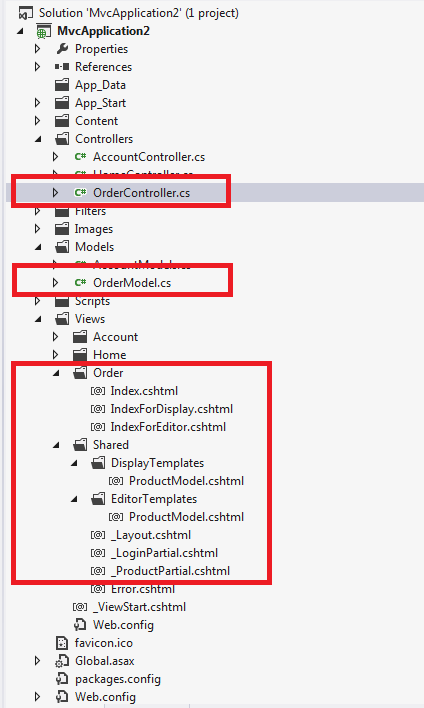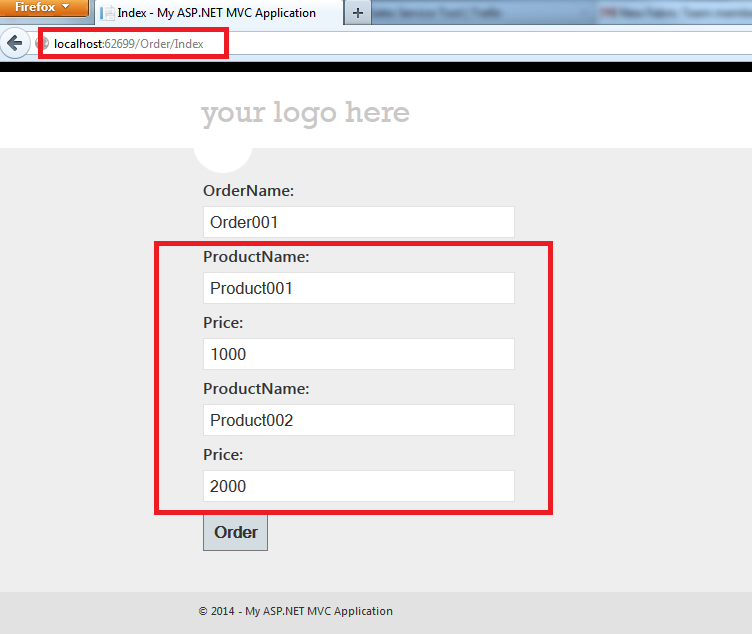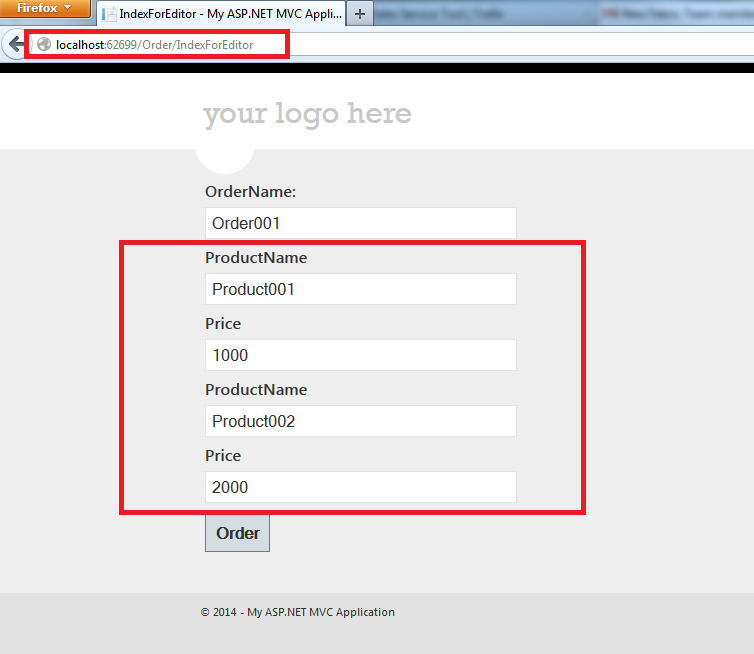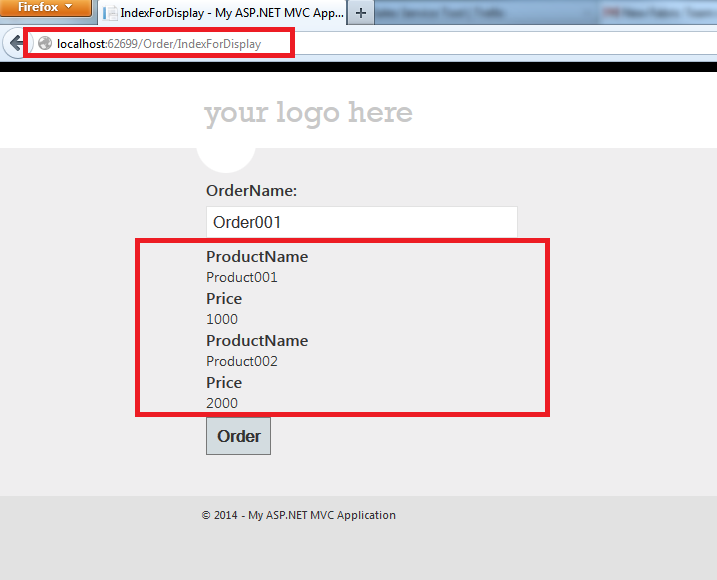在Asp.Net MVC中PartialView与EditorFor和DisplayFor的区别
相同之处:
PartialView, EditorFor 和 DisplayFor 都可以用作来实现页面的公共部分,其他页面可以根据需求来引用。
不同之处:
PartialView 是从Page的角度来处理,因此主 Page 和 PartialView 一般用相同的Model,这样做可以实现PartialView中所对应字段的编辑功能;如果PartialView使用的是主Page中Model的子Model,那么只能实现Partial View所对应Model的显示功能。
具体的引用方式为: @Html.Partial("~/Views/Shared/_ProductPartial.cshtml") @Html.Partial("~/Views/Shared/_ProductPartial.cshtml", Model.Products) @Html.RenderPartial("~/Views/Shared/_ProductPartial.cshtml")
EditorFor和DisplayFor是从Model的角度来处理,此时DisplayFor实现的是子Model的显示功能,EditorFor实现的是子Model的编辑功能。
具体的引用方式为: @Html.EditorFor(m => m.Products) @Html.DisplayFor(m => m.Products)
下面将用一个简单的例子加以说明
1): 工程代码结构

2):Model 结构
public class OrderModel { public string OrderId { get; set; } public string OrderName { get; set; } public List<ProductModel> Products { get; set; } } public class ProductModel { public string ProductId { get; set; } public string ProductName { get; set; } public double Price { get; set; } }
3):PartialView
3.1):Action Index
public ActionResult Index() { OrderModel myOrder = GetMyOrder(); return View(myOrder); } [HttpPost] public ActionResult Index(OrderModel model) { OrderModel myOrder = GetMyOrder(); return View(myOrder); }
3.2):Index.cshtml
@model MvcApplication2.Models.OrderModel @{ ViewBag.Title = "Index"; } @using (Html.BeginForm()) { @Html.AntiForgeryToken() @Html.ValidationSummary(true) <div> <label>OrderName: </label> @Html.TextBoxFor(m => m.OrderName) </div> <div> @Html.Partial("~/Views/Shared/_ProductPartial.cshtml") </div> <input type="submit" value="Order" /> }
3.3):_ProductPartial.cshtml
@model MvcApplication2.Models.OrderModel <div> @foreach (var item in Model.Products) { <div> <label>ProductName: </label> <input value="@item.ProductName" /> </div> <div> <label>Price: </label> <input value="@item.Price" /> </div> } </div>
3.4):运行结果截图

4):EditorFor
4.1):Action IndexForEditor
public ActionResult IndexForEditor() { OrderModel myOrder = GetMyOrder(); return View(myOrder); } [HttpPost] public ActionResult IndexForEditor(OrderModel model) { OrderModel myOrder = GetMyOrder(); return View(myOrder); }
4.2):IndexForEditor.cshtml
@model MvcApplication2.Models.OrderModel @{ ViewBag.Title = "IndexForEditor"; } @using (Html.BeginForm()) { @Html.AntiForgeryToken() @Html.ValidationSummary(true) <div> <label>OrderName: </label> @Html.TextBoxFor(m => m.OrderName) </div> <div> @Html.EditorFor(m => m.Products) </div> <input type="submit" value="Order" /> }
4.3):ProductModel.cshtml
@model MvcApplication2.Models.ProductModel <div> @Html.LabelFor(m => m.ProductName) @Html.TextBoxFor(m => m.ProductName) </div> <div> @Html.LabelFor(m => m.Price) @Html.TextBoxFor(m => m.Price) </div>
4.4):运行结果截图

5):DisplayFor
5.1):Action IndexForDisplay
public ActionResult IndexForDisplay() { OrderModel myOrder = GetMyOrder(); return View(myOrder); } [HttpPost] public ActionResult IndexForDisplay(OrderModel model) { OrderModel myOrder = GetMyOrder(); return View(myOrder); }
5.2):IndexForDisplay.cshtml
@model MvcApplication2.Models.OrderModel @{ ViewBag.Title = "IndexForDisplay"; } @using (Html.BeginForm()) { @Html.AntiForgeryToken() @Html.ValidationSummary(true) <div> <label>OrderName: </label> @Html.TextBoxFor(m => m.OrderName) </div> <div> @Html.DisplayFor(m => m.Products) </div> <input type="submit" value="Order" /> }
5.3):ProductModel.cshtml
@model MvcApplication2.Models.ProductModel <div> @Html.LabelFor(m => m.ProductName) @Html.DisplayTextFor(m => m.ProductName) </div> <div> @Html.LabelFor(m => m.Price) @Html.DisplayTextFor(m => m.Price) </div>
5.4):运行结果截图

6):公共方法
private OrderModel GetMyOrder() { OrderModel order = new OrderModel(); order.OrderId = "o001"; order.OrderName = "Order001"; List<ProductModel> productList = new List<ProductModel>(); ProductModel product001 = new ProductModel(); product001.ProductId = "p001"; product001.ProductName = "Product001"; product001.Price = 1000.00; ProductModel product002 = new ProductModel(); product002.ProductId = "p002"; product002.ProductName = "Product002"; product002.Price = 2000.00; productList.Add(product001); productList.Add(product002); order.Products = productList; return order; }
更多详细信息请看: http://stackoverflow.com/questions/5037580/asp-net-mvc-3-partial-vs-display-template-vs-editor-template




